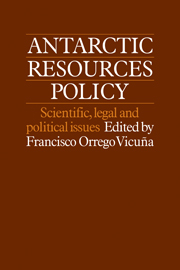Book contents
- Frontmatter
- Contents
- List of contributors
- 1 Antarctic resources policy: an introduction
- Part one The state of Antarctic knowledge and experience
- Part two The policy for the conservation of the living resources of Antarctica
- Part three The policy for the exploration and exploitation of the mineral resources of Antarctica
- 11 Geologic data and its impact on the discussion on a regime for mineral resources
- 12 Basic conditions for the exploration and exploitation of mineral resources in Antarctica: options and precedents
- 13 Oil as a special resource: problems and experiences
- 14 An overview of the problems which should be addressed in the preparation of a regime governing the mineral resources of Antarctica
- 15 The definition of a regime on Antarctic mineral resources: basic options
- 16 Criteria for access to the resources of Antarctica: alternatives, procedure and experience applicable
- Part four Issues on Antarctica and the law of the sea
- Part five The policy for Antarctic cooperation
11 - Geologic data and its impact on the discussion on a regime for mineral resources
Published online by Cambridge University Press: 06 July 2010
- Frontmatter
- Contents
- List of contributors
- 1 Antarctic resources policy: an introduction
- Part one The state of Antarctic knowledge and experience
- Part two The policy for the conservation of the living resources of Antarctica
- Part three The policy for the exploration and exploitation of the mineral resources of Antarctica
- 11 Geologic data and its impact on the discussion on a regime for mineral resources
- 12 Basic conditions for the exploration and exploitation of mineral resources in Antarctica: options and precedents
- 13 Oil as a special resource: problems and experiences
- 14 An overview of the problems which should be addressed in the preparation of a regime governing the mineral resources of Antarctica
- 15 The definition of a regime on Antarctic mineral resources: basic options
- 16 Criteria for access to the resources of Antarctica: alternatives, procedure and experience applicable
- Part four Issues on Antarctica and the law of the sea
- Part five The policy for Antarctic cooperation
Summary
Introduction
More than 200 years have passed since Antarctica was discovered by Captain James Cook in 1775. This magnificent polar expanse is an unremitting desert of ice. The wind carries the silence of the pole to the land's edge, broken by the glaciers torn from the shore, which bare the rock formations within. These glaciers struggle against the advance of the polar ocean waters from which life springs, finding a most awe-inspiring balance in its constant struggle to gain a foothold in this exceedingly hostile environment.
It is into this fantastic and rich polar landscape that man, with his technology, set foot. The polar silence has witnessed incredible human exploits as man strived first to discover territory, later to unravel the answers to scientific mysteries, and today, as he struggles to occupy this land, manage it and extract its natural resources in his quest to prolong and perpetuate his existence on Earth.
This is the one-hundredth anniversary of the First International Polar Year (1882–83) – the first international cooperative effort in the subantarctic to investigate the Southern Hemisphere of the Earth. It was one of the great milestones in the history of mankind, not only because of the scientific knowledge that was obtained, but primarily because of its philosophical impact, which opened up a new era in scientific research, international cooperation, information exchange and the development of joint projects. It allowed us first to decipher – and today, to have an even clearer view of – the evolution of this planet Earth, and to delve more deeply into the universe which surrounds us.
- Type
- Chapter
- Information
- Antarctic Resources PolicyScientific, Legal and Political Issues, pp. 159 - 166Publisher: Cambridge University PressPrint publication year: 1983

